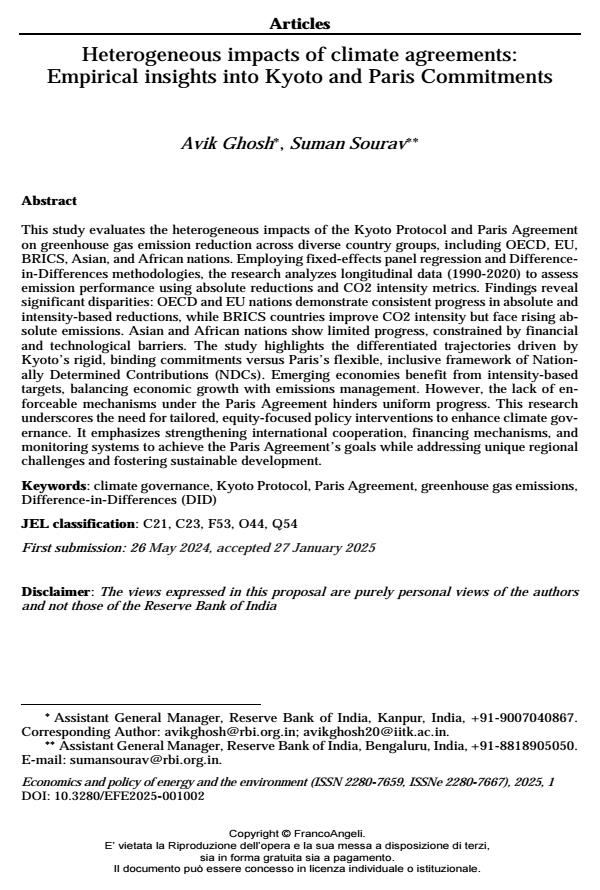Heterogeneous impacts of climate agreements: Empirical insights into Kyoto and Paris Commitments
Titolo Rivista ECONOMICS AND POLICY OF ENERGY AND THE ENVIRONMENT
Autori/Curatori Avik Ghosh, Suman Sourav
Anno di pubblicazione 2025 Fascicolo 2025/1
Lingua Inglese Numero pagine 27 P. 37-63 Dimensione file 302 KB
DOI 10.3280/EFE2025-001002
Il DOI è il codice a barre della proprietà intellettuale: per saperne di più
clicca qui
Qui sotto puoi vedere in anteprima la prima pagina di questo articolo.
Se questo articolo ti interessa, lo puoi acquistare (e scaricare in formato pdf) seguendo le facili indicazioni per acquistare il download credit. Acquista Download Credits per scaricare questo Articolo in formato PDF

FrancoAngeli è membro della Publishers International Linking Association, Inc (PILA)associazione indipendente e non profit per facilitare (attraverso i servizi tecnologici implementati da CrossRef.org) l’accesso degli studiosi ai contenuti digitali nelle pubblicazioni professionali e scientifiche
This study evaluates the heterogeneous impacts of the Kyoto Protocol and Paris Agreement on greenhouse gas emission reduction across diverse country groups, including OECD, EU, BRICS, Asian, and African nations. Employing fixed-effects panel regression and Difference-in-Differences methodologies, the research analyzes longitudinal data (1990-2020) to assess emission performance using absolute reductions and CO2 intensity metrics. Findings reveal significant disparities: OECD and EU nations demonstrate consistent progress in absolute and intensity-based reductions, while BRICS countries improve CO2 intensity but face rising absolute emissions. Asian and African nations show limited progress, constrained by financial and technological barriers. The study highlights the differentiated trajectories driven by Kyoto’s rigid, binding commitments versus Paris’s flexible, inclusive framework of Nationally Determined Contributions (NDCs). Emerging economies benefit from intensity-based targets, balancing economic growth with emissions management. However, the lack of enforceable mechanisms under the Paris Agreement hinders uniform progress. This research underscores the need for tailored, equity-focused policy interventions to enhance climate governance. It emphasizes strengthening international cooperation, financing mechanisms, and monitoring systems to achieve the Paris Agreement’s goals while addressing unique regional challenges and fostering sustainable development.
Parole chiave:climate governance, Kyoto Protocol, Paris Agreement, greenhouse gas emissions, Difference-in-Differences (DID)
Jel codes:C21, C23, F53, O44, Q54
Avik Ghosh, Suman Sourav, Heterogeneous impacts of climate agreements: Empirical insights into Kyoto and Paris Commitments in "ECONOMICS AND POLICY OF ENERGY AND THE ENVIRONMENT" 1/2025, pp 37-63, DOI: 10.3280/EFE2025-001002